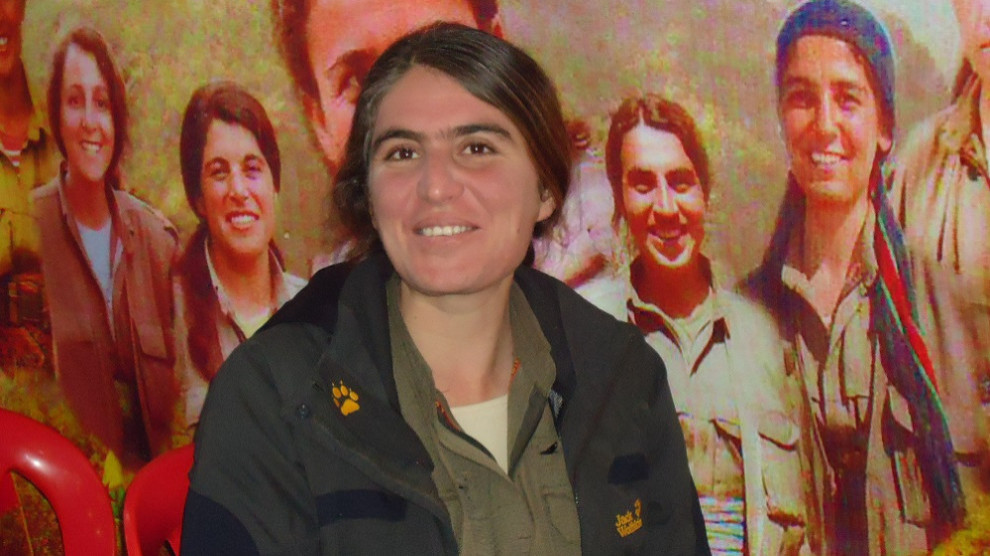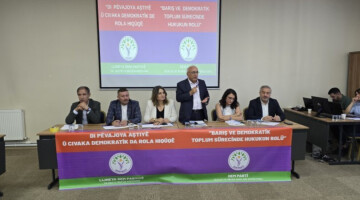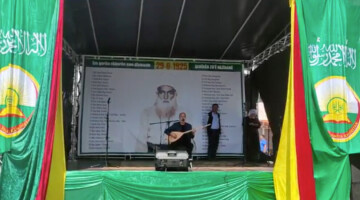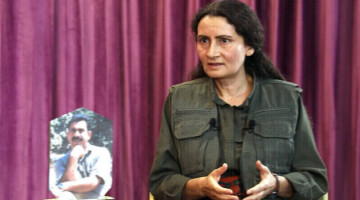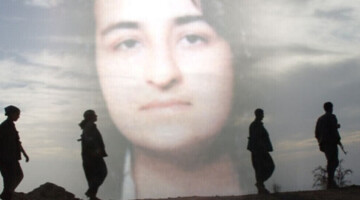Şerda Mazlum Gabar is a commander at the headquarters of the women's guerrillas, YJA-Star. She actually attaches similar importance to 1 June 2004 as she does to the beginning of the armed struggle on 15 August 1984.
The attempts to destroy the PKK from the inside
Şerda Mazlum Gabar recalls the attempts to destroy the Kurdish freedom movement from the inside by people like Osman Öcalan. “The 1 June offensive took place in the context of the international plot against President Abdullah Öcalan. At that time, various circles tried to destroy our movement by doing everything possible to bring it in line with the imperialist states. They knew that our movement was not only fighting against the Turkish state, but against all imperialist forces. The US had planned to use these circles to impose their liberal line on us and to completely destroy our movement."
One of the first steps was that taken by the circle around Osman Öcalan who tried to introduce marriage in the guerrillas and dissolve the women's army. Alluding to these attacks, Gabar explains: “They tried to dissuade us from Abdullah Öcalan and his ideology and to weaken the moral standards he had created to adapt instead the struggle to their interests. When Abdullah Öcalan was captured, they tried to present themselves as new leaders of the movement. But the guerrillas and the whole people stood up for Öcalan's ideology and made it clear that their endeavour was doomed to fail.”
The defeat of the internal attackers
The guerrilla commander continues: “The United States attempted to harm our movement through these internal attackers. However, when we received Öcalan's defense writings, and particularly 'Defending a People', we used it and saw it as an antidote. In his defense writings, Öcalan told us that 'those who defend the ideology of apoism have the right form of guerrilla warfare and fight with the right understanding. The guerrillas are not only responsible for the armed struggle, but also for properly advocating and implementing the ideology into practice. They are also responsible for defending the line against internal attackers. The 1 June 2004 offensive was the clearest answer to the internal attackers' attempts to destroy the movement. If 1 June had not existed, nothing would have been left of the PKK or the Kurdish people, they would have been wiped out of history. The 1 June offensive has been ideologically and militarily one of the most important offensive since 15 August 1984. With this offensive, our forces have once again established themselves on the front in Northern Kurdistan. In this sense, it represents the victory over the internal attack. 1 June meant holding on to Abdullah Öcalan's line and free life. This offensive showed that we were determined and inspired to implement the new paradigm of apoism.”
Kendal Baz led the offensive
Commander Gabar continues: “The 1 June offensive was led by Kendal Baz (Yusuf Saruhan). He fell martyr in the Gabar region in 2004. Kendal's role is comparable to the Mahsum Korkmaz, which led the offensive on 15 August 1984 in Eruh. Kendal went to the same place with two comrades and destroyed a vehicle carrying several Turkish military commanders. Silav carried out an action alone in the center of Siirt and inflicted heavy losses on the enemy. She was eventually sold by informers and was surrounded by the enemy. She refused to give up in the spirit of Bêrîtan. She fell in dignity. In Dersim, Heval Têkoşin and Seyit Riza fought to the last bullet and fell martyrs. Şehîd Sorxwîn, Adar, Yıldız Gülbahar and Adil fell martyrs in a courageous fight. The legendary stance of commanders Reşît and Rojîn set the course for the fight in 2012. Alî Piling, Çîçek Botan, Şêvîn Bingöl and Têkoşin Amanos can also be seen as today's victims of 1 June 2004.”
The struggle today is based on the achievements of 1 June
Commander Gabar adds: “Although the enemy is trying to destroy the guerrillas with its technology and intelligence, the guerrilla warfare continues with effective tactics. The fighters continue to insist on leading a free life. Şehîd Hawar is an example of this. He fell martyr in Xakurke, and although he had never met Öcalan personally, he was deeply connected to his ideology, the people and the country. Heval Hawar had led many actions in the spirit of Reşit Serdar. Arin is another example. She was injured on the front in the north. The enemy thought she was dead, but when the soldiers approached, she blew herself up to avoid falling into the enemy's hands.
The restructuring project
Commander Gaber says: “As part of the restructuring project, we introduced changes in the shape and tactics of guerrilla warfare. It was not just a question of how the guerrillas could defend themselves, it was also a concrete question of how the guerrillas should wage war. This restructuration was actually put into practice by Abdullah Öcalan in 1996, right after the Heval Zîlan campaign. But we did not understand it enough at the time. We used the guerrilla tactics more effectively in the 1 June offensive, but due to the technology developed, we enriched the guerrillas warfare with new forms of action and tactics as part of this project. We are no longer limited to resistance alone, it is about our people experiencing victory.
'We pay tribute to Sema Koçer'
With the guerrilla campaigns in 2020, we saw that the restructuring project brought. It's about attacking the enemy with fewer forces in places where he doesn't expect to. Clandestinely acting, in-depth planning and freedom are the main features. Nobody should know what, when and where the guerrillas would strike.”
Sema Koçer's action on 31 March, in which the fighter sacrificed herself and killed at least 30 Turkish army soldiers damaging a strategically important pipeline near Ağrı, was one of the most sensational actions by the guerrillas this year.
Gabar says: “Sema Koçer's Fedai campaign opened up a great perspective for the guerrillas. And with the actions from Garzan to Dersim, an important new line has taken place that gives us great moral. The enemy's dirty policies have failed. The actions in the provinces of Avaşin, Xakurke and Gever were also effective.”
The 21st century is the century of the women's revolution
The YJA-Star has dealt heavy blows to the enemy with its own actions, said commander Gabar, adding: “That also gave us morale and increased our determination. We also experienced a creative new beginning on a tactical level. The YJA-Star is the most concrete expression of the free commander and the guerrilla fight. It is not only fighting for the women and peoples in Kurdistan and the Middle East, it is fighting for all women in the world. They are the self-defense force of women, both against the ruling system and against the rapist mentality of the patriarchy. The 21st century is the century of the women's revolution. There is a determination among women to build self-defense networks from Latin America to India.”
The enemy knows no values
Commander Gabar ends her remarks with the following words: “We will foil the enemy's concept of annihilation in 2020 with effective, surprising and frightening actions and defeat the international conspiracy. We must widen our struggle so that our people can achieve free living conditions. If we don't expand the resistance, the enemy will brutally attack all our values. The enemy even fears the bodies of our friends and attacks our cemeteries, our dignity. It is time to stand up for our dignity and our values."

